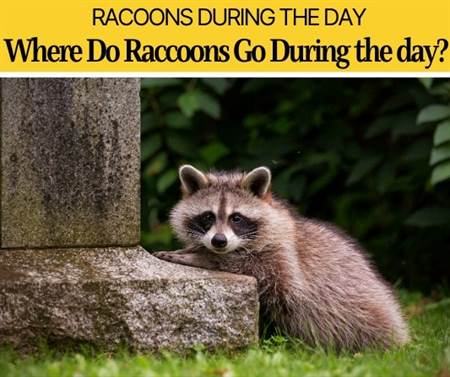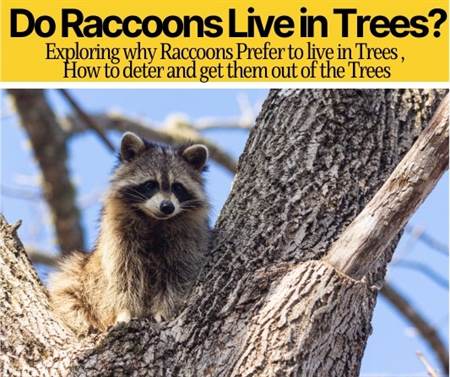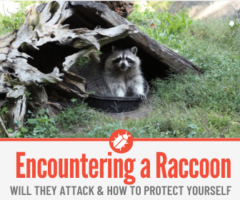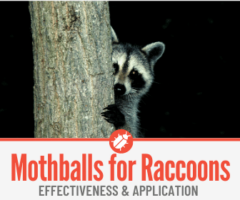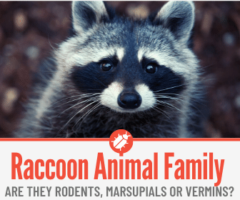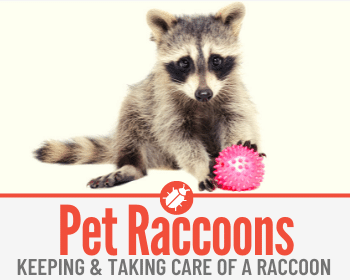 Have you ever wondered what it would be like to bond with an adorable Raccoon?
Have you ever wondered what it would be like to bond with an adorable Raccoon?
They look so cuddly, but raccoons can also be destructive bandits in the night, so are they safe to keep as pets?
Surprisingly, it is legal in certain states to keep a pet raccoon, but laws vary.
Raising a Raccoon is a large undertaking, and it’s vastly different from raising a dog or a cat.
In this article, we’ll explore what it really takes to raise a pet raccoon.
We’ll discuss how to properly feed, house, and care for a raccoon.
We’ll also look at the logistics of keeping a pet raccoon including the legality, regulation, and potential health concerns.
Let’s look at what raccoons are like as pets.
Can Raccoons Be Pets
With the proper time, stability, and care in a household raccoons can indeed become pets. However, many experts advise against it because of the taxing efforts that go into properly raising a raccoon.
Raccoons are known for their sly and, at times, downright destructive behavior.
Still, if cared for properly, raccoons can make a wonderful and fulfilling pet.
Keeping a pet raccoon is not anything comparable to owning a dog or cat. A certain level of care and appropriate understanding of the animal is required to keep a pet raccoon.
If you’re skeptical in any way, it is not recommended that you keep a raccoon for a pet.
If you’re over-concerned about your personal items, the cleanliness of your home, or avoiding getting scratched or bitten – this is not the pet for you.
But if you have the means and the time and you put in enough effort with ample ambition – you could potentially be caring for one of the smartest, and cutest, pets you could ask for.
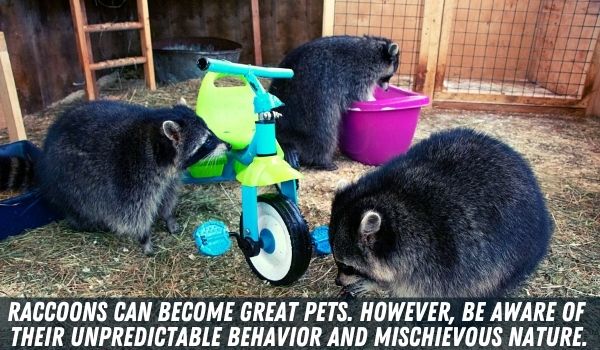
Do Raccoons Make Good Pets
Though highly unusual and extremely rare, a decently domesticated raccoon can make a wonderful pet.
Owners who have trouble-free raccoon friends find the relationship uniquely rewarding since raccoons are so intelligent, cuddly, and fun.
Raccoons are intelligent enough to problem solve, and they can easily use their wit to get themselves in or out of trouble. They also have impressive memories.
Although they’re wild animals, pet raccoons can love cuddling, on their terms. Especially baby raccoons, or kits, make phenomenal cuddle-buddies.
On the flip-side – some days your pet raccoon will not want to be near you.
In fact, your raccoon’s personality can seem to flip on a switch, and they can suddenly become aggressive or destructive.
This unpredictable behavior and mischievous nature of raccoons is their wild side coming out.
The reason raccoons make such high-maintenance pets is because they’re not meant to be pets at all.
Under the right conditions though, raccoons can coexist with caring human companions, and make wonderful pets. Just don’t expect them to grow out of their wild behavior.
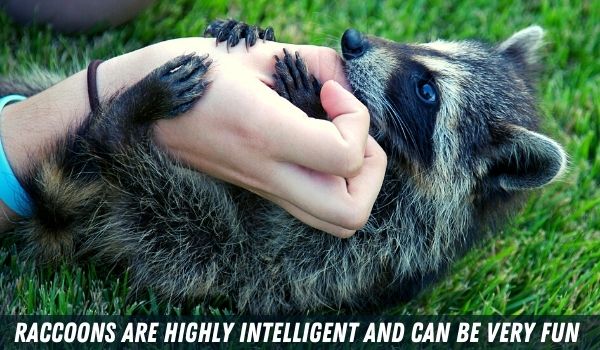
Some Raccoons can be very friendly…
However, raccoons won’t become cordial just because they are taken in by humans.
Many raccoon babies are sweet and cuddly.
As they grow up though, their adult behavior can be incredibly unpredictable, and not always in a friendly manner!
Raccoons, even pet ones, will scratch, nibble, and bite you without any notice.
They may even jump on you from great heights, like a tree, if they’re feeling playful!
Adult pet raccoons can still keep their friendly behavior, especially if all of their immediate needs are met like proper shelter, food, and water.
Not all pet raccoons will behave accordingly. Even mild-tempered raccoons can have a mean streak or a sudden outburst in the form of an attack.
If you form a bond with a raccoon and take care of it well, it’s safe to say you have a friendly pet.
But with raccoons, it’s best to stay guarded either way.
Preparing to Raise a Raccoon
It’s ideal to raise a raccoon with at least one other raccoon so that they are socialized and fulfilled.
It’s instinctual for raccoons to form bonds in their youth.
Baby raccoons are especially demanding, and a single person who daily and frequently cares for them helps raise a healthy raccoon.
Raising raccoons is a ginormous task that can be taxing for owners.
The process will consume much of your time, energy, and money, and it may result in damaged property, too.
Still, a raccoon can be taught commands, litter-trained, and even go on walks.
Raising raccoons requires that they have a properly enriched enclosure and healthy foods, water, and exercise.
Read further in this article for an in-depth look at what it takes to raise a raccoon.
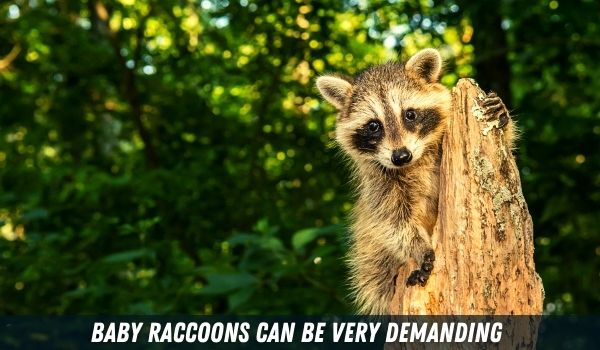
What to Feed Your Pet Raccoon
Raccoons are omnivores, just like humans. Raccoons eat both plants and meat.
Some meals a raccoon might enjoy are fish, poultry, veggies, fruits, eggs, insects, and even dog food.
Known for their trash bandit behavior, raccoons aren’t picky about their food since they’re used to rummaging for it.
Raccoons will see if they can eat almost anything they see, so it’s important to limit and monitor their diet.
In addition to fruits and vegetables, pet raccoons can be fed canned dog food as a dietary addition.
Treats and fatty foods should be fed to pet raccoons meagerly as pet raccoons often are at risk for obesity.
Ask your vet about portion sizes your pet raccoon should eat based on their age and exercise habits.
Always keep fresh water ready for your pet raccoon, and two dishes of water may be recommended.
This is because raccoons commonly dip their food in water, if they’re able to.
Captive raccoons douse their food in water, and they appear to be cleaning it. However, scientists are finding evidence against this and speculate this action is based on instinct.
Some raccoons may enjoy “food puzzles”, which are more like food obstacle courses that the raccoon must complete to access their treat.
Raccoons enjoy using their intellect and find enrichment through getting food rewarded to them.
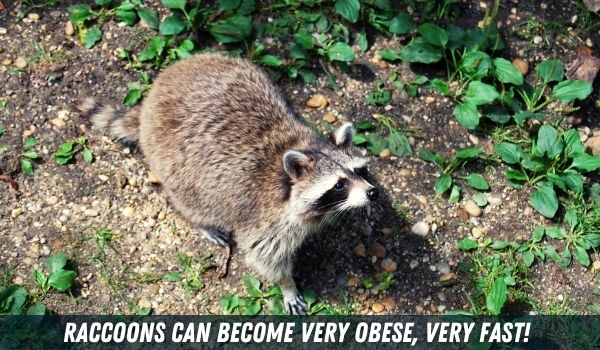
Housing Your Raccoon
The most ideal housing scenario for a pet raccoon would be a large, outdoor enclosure that allows it much space for play, mischief, and exercise.
If they must be indoors, they deserve a similarly idyllic space to play and explore daily.
The daily housing space for your pet raccoon must be scanned and assessed for anything that could be damaged or cause potential injury to you or your pet.
Remove all potentially breakable, valuable, sentimental, or dangerous items.
All raccoons are wild animals, no matter how domesticated, and it should be assumed that anything in your raccoon’s space may get destroyed.
That’s why an outdoor enclosure will make the best space for your pet raccoon, especially if it has trees and shrubbery great for climbing and exploring.
You can build your own to make the perfect sanctuary for your pet raccoon.
No matter their enclosure, ensure your pet raccoon has constant access to food, water, shelter, bedding, and play accessories like toys and climbing structures.
Food puzzles, games, and raccoon companions are optional but can be highly enriching for your pet.
No matter what, don’t expect your pet raccoon’s living space to stay clean.
Also, consider extra structure or outside paneling for your enclosure as they can escape!
Overall, a small cage is unfulfilling for a pet raccoon.
By keeping your pet raccoon in a small, uncomfortable enclosure that doesn’t allow room for play, you are raising an upset, unfriendly, and – most importantly – unhappy animal.
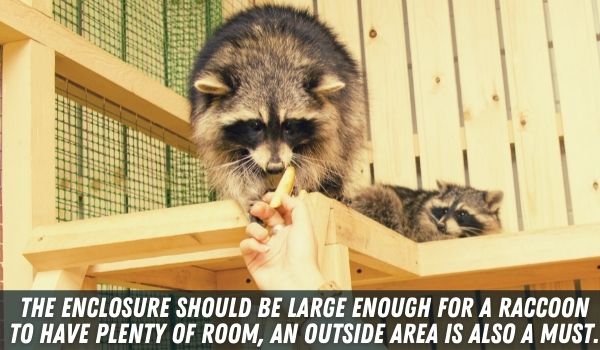
Common Raccoon Health Problems
There are many health concerns to be aware of for yourself and other pets you may have when housing a raccoon.
You’ll want to find the proper vet for your raccoon, which can be difficult, but this is essential in caring for your pet raccoon.
Locate a veterinarian who is qualified and ideally has experience with or specializes in care for wildlife animals.
The vet will know how to prepare this animal for its healthiest life in captivity which could include vaccinations, extra precautions, and even dietary restrictions.
The health concerns for a pet raccoon that you need to be most aware of are:
1.Rabies
Raccoons are the main carrier of rabies, and rabies is one of the most seriously concerning possibilities you must consider when keeping a pet raccoon.
Not only will rabies be incurable and deadly for your pet raccoon, but it can and will spread to your other pets, your loved ones, and yourself.
If rabies isn’t cured before symptoms set in, it will kill whoever has it.
That said, if your pet raccoon bites or scratches someone, it can be taken away and tested for rabies.
The only way to test for rabies in the raccoon will be to euthanize it, so keep your raccoon and your loved ones safe.
You can spot rabies in your pet raccoon easily.
They’ll exhibit odd behaviors like staggered, erratic walking, with their backs arched up, discharge from their eyes or mouth that wets their face, and repetitive high-pitched noise making.
Your pet raccoon can be vaccinated for rabies with a canine rabies vaccine, but the vaccine isn’t proven to be effective in raccoons.
Either way, it is worth it to take extra-high precautions and vaccinate your pet raccoon.
2.Canine Distemper
Your pet raccoon should also be vaccinated against canine distemper.
Raccoons and dogs can transfer canine distemper, a deadly disease, to each other.
Canine Distemper is a contagious virus that affects the nervous, respiratory, and gastrointestinal systems. It can show itself in two different ways in raccoons.
Some raccoons will show eye infection, runny nose, and upper respiratory problems.
Other raccoons will appear “dumb” or friendly, showing a stumbling walk and being overly friendly with humans.
3.Baylisascaris
Baylisascaris is another highly infectious, dangerous, and deadly disease that raccoons can have.
Baylisascaris is a type of roundworm, and it can infect humans and dogs, too.
Baylisascaris can travel through egg spores in the raccoon’s feces. These egg spores can become airborne, making it all too easy to become infected.
The raccoon may not even exhibit sickly behavior with this type of roundworm, especially since the egg spores can live dry and inactive for years.
This makes it especially difficult to notice in pets.
Baylisascaris in humans can be disastrous as this roundworm can make its way to the brain, cause blindness, and even cause loss of muscle control.
And those are only a few of the symptoms that make it obvious this is not an illness you want for you or your pet.
Other Health Risks
Another health concern for raccoons living in captivity is obesity, which is common in pet raccoons. Be sure to watch how much you are feeding your pet raccoon.
Aside from the above, pet raccoons can also experience the following health problems:
- Salmonella
- Leptospirosis
- Fleas
- Skin infections
- Chagas disease
- Rocky Mountain spotted fever
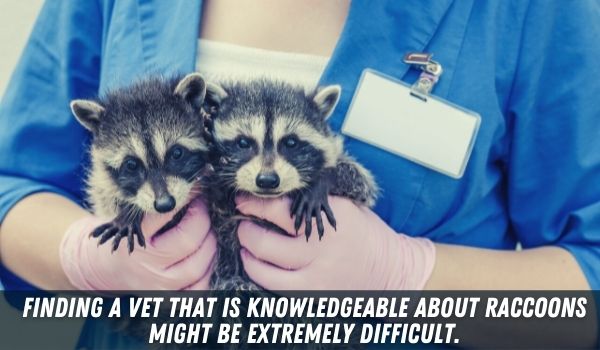
What do Raccoons Like to Play With
Raccoons are immensely playful and mischievous.
It’s safe to say that they can turn just about anything into a toy, from the change in your pocket to your furniture.
Keep your pet raccoon away from anything you don’t want it touching. Everything is fair game to a raccoon!
Toy ideas for your pet raccoon can be as simple as a frozen grape in their water bowl or a bar of soap to play with during their bath. They also appreciate enrichments in their living environment like structures to climb or hammocks to relax in.
Here are some other toy and enrichment ideas:
- Freeze food in a bucket, then removing the food to make a frozen treat.
- Put frozen grapes in their water bowl.
- Allow them to play with the bar of soap in their bath.
- Stuff peanut butter in a hollow bone or a “Kong” toy.
- Securely hang a bucket from the ceiling of their enclosure.
- Leave small fish in their pond to “fish” for.
Other enrichments your pet raccoon may appreciate are new scents and textures such as fish oil scents and dried leaves in their enclosure.
For added fun at feeding time, hide their food from them, or allow them to “hunt” for it.
Raccoons have been long established to be bandits, so they enjoy having a place to stash their finds and their food.
Allow your pet raccoon to make its own “secret” spaces either for hiding or stashing items.
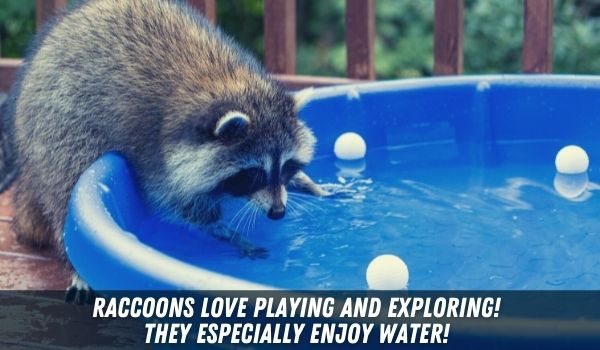
Raccoon Personality
One of the many appeals to owning a pet raccoon is that, just like humans, each raccoon has its own unique personality.
Some raccoons are naturally friendly and curious by nature, while other raccoons may possess a shyer disposition, only showing themselves to familiar faces.
All raccoons, however, are highly intelligent. Raccoons are known for their wit and their aptitude for puzzles and problem-solving.
Don’t let their smarts fool you – these are also some of the most playful creatures!
Raccoons absolutely love goofing around, causing mischief, and letting their curious nature get the best of them.
Raccoons are vocally quiet, but they’re rambunctious nonetheless.
If they get too playful, they can nip, bite or scratch humans easily, even their favorite ones, so be careful when playing with a pet raccoon.
A comfortable raccoon will exhibit all of these personality traits and more.
As pets, they will usually have one or two humans with whom they are more affectionate, which is when they show their cuddly side.
If you want such a well-rounded and fun-loving raccoon pet, they will require the utmost attention, care, and patience from you. Owning a raccoon is not a job to be taken lightly, so it’s also important to accept that your raccoon may never be truly domesticated.
At the end of the day, raccoons did not allow themselves to be domesticated the same way dogs and cats have been.
Their wild nature will persist, and a pet-owner relationship with a raccoon is best nurtured if understood from this vantage point.
Because of their complex, wild, and unique personalities, pet raccoons are not for everyone. Most experts advise against keeping them as pets because of this.
Pet Raccoon Problems
Raccoons as pets are unusual, so naturally, caring for one can come with a large set of problems.
The main concern as a raccoon owner is safety.
Taking caution around the safety of your other pets, children, and yourself is important because a raccoon can and will easily bite or scratch humans and other animals.
Raccoons are complete troublemakers, so keeping them away from humans, especially children, is a smart idea.
Younger raccoons can more easily be handled though, so they can be raised being more used to a human touch.
Just be aware that if your raccoon feels threatened, it will bite. This is bad for the safety, legality, and livelihood of your pet raccoon, who may be forced to be put down and tested for rabies.
Their wild nature and high intelligence mixed with their mischief, raccoons can get pretty rowdy, and destroy all your belongings in the process.
When it comes to raccoons, nothing is off-limits.
That means your furniture, bed sheets, door frames, kitchen appliances, curtains, and even your walls and ceilings are at risk of being mauled by this pet.
This can all be avoided by keeping your pet raccoon in a comfortable housing setting, where it feels free to be its wild self.
But if you need to keep your raccoon indoors, child-proofing, or raccoon-proofing, is a must.
Aggressive raccoons will be all the more destructive if they’ve already reached sexual maturity.
New baby-raccoon owners will often think twice about their decision to raise a raccoon once it has turned six months or so because their personalities can shift drastically.
Before raccoons experience these hormonal changes, it’s recommended that you take them to the vet for sterilization surgery, and either have your raccoon spayed or neutered.
Another concern with pet raccoons is the simple fact that having one as a pet is unusual and rare.
It can be difficult to find ideal veterinary care, obtain proper paperwork, or even convince authorities that you rightfully own your pet, so make sure you’ve double checked all necessities as a raccoon caretaker.
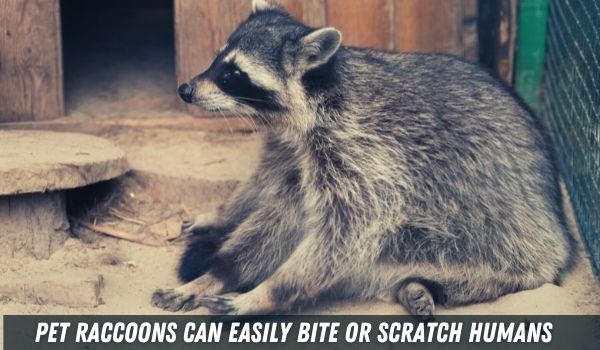
Can Raccoons be Tamed
Raccoons, especially baby raccoons, can appear so cute and cuddly that it’s often assumed they can be fully tamed. Unfortunately, this is not the case.
Raccoons will never fully be tamed as they are wild animals.
This is especially true for raccoons who have reached sexual maturity which they experience starting around six months old to two years.
Once they reach sexual maturity, an adult raccoon becomes much harder to train, bond with, and ultimately tame. There is a reason that having a raccoon for a pet is rare.
Also, raccoons are highly individualistic animals.
Some raccoons are just more aggressive than others, and they can be full of surprises, too.
Some raccoon owners have had wonderful, tame pet raccoons that one day suddenly snaps by biting or attacking their owner. It’s rare, but it does happen.
Taming and Training a Raccoon
As wild animals with as unique of personalities, as we have, some raccoons will no doubt be easier to train than others.
And while a raccoon can never truly or fully be domesticated, training one is possible.
Raccoons are simplest to train when they are with owners whom they’re affectionate to, and who have taken the time to bond. Even tame raccoons can get in plenty of trouble, though!
Since raccoons are so smart, they can definitely learn simple commands that your dog may know, such as “sit” or “shake”.
Raccoons can also be trained to use a litter box, and this is recommended for easy pet clean-up. Training a raccoon to use a litter box can take up to a few months.
Recounts of pet raccoons include that raccoons can be trained to walk on a leash, but this is rare and often temporary, as in for walks only.
Domesticating a Raccoon
Raccoons have had thousands of years to become domesticated just like dogs and cats, yet they remain wild animals. It’s safe to say that as a species, raccoons have decided to keep it that way.
This is not an animal that is possible to force into domestication, as true domestication requires centuries anyway.
Taking extra precautions and steps to raccoon-proof your home and keep yourself safe is necessary.
That being said, leaving a pet raccoon in a large crate with some food will not cut it!
Raccoons need space to be their true wild selves, otherwise, you will have a very unhappy pet.
Their wild nature may come out in unexpected ways, too. If upset with you, they may purposefully leave accidents around your house or where they shouldn’t.
Remember, they are smart animals!
These are certainly not obedient animals.
Raccoons often learn their names and can learn other commands, but whether they choose to heed your calls will be entirely up to them.
Even if your pet raccoon is neutered or spayed, it will still exhibit wild behavior.
This wild nature of raccoons needs to be expected going into the serious responsibility of owning one.
Unfortunately, too many humans take in a raccoon, only to realize how truly wild the animal is, and then they give or shoo the raccoon away.
The problem here is that often owners decide this shortly after raccoons meet sexual maturity, and now the raccoon’s younger years that could have been spent adapting to the wild have been all but taken away from them.
Depriving a pet raccoon of developing their natural instincts and abilities, and then punishing them later for it by forcing them back into the wild is cruel.
Once a raccoon has tasted domestic life, it is your responsibility to make sure the animal remains safe.
No matter how sweet your pet raccoon is, remember that it’s not going to ever truly be domesticated.
However, there are some instances of human-raccoon relationships that are harmonious, tons of fun, and ultra adorable.
If you’re thinking of owning a pet raccoon in hopes of taming it, consider everyone in the household, including your other pets.
They might not be so keen on sharing their space with wild animals.
For this reason, see if you can offer spaces for each pet.
At least set the raccoon’s space up so that other pets can flee easily or vise versa.
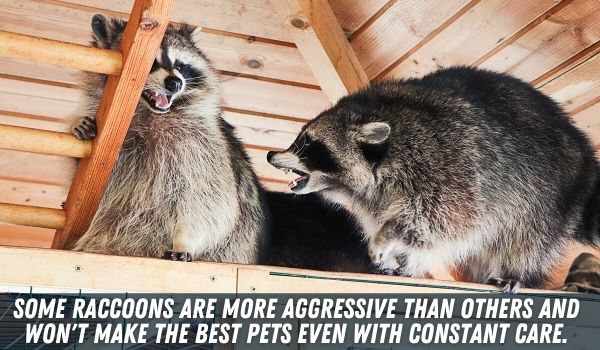
Great Examples of Domesticated Raccoons
The most famous example of a pet raccoon would be Rebecca the Raccoon of the White House under the presidency of Calvin Coolidge, whose whole family cared for her.
Oddly enough, Rebecca was supposed to be Thanksgiving dinner for the Coolidge family in 1926, as she was gifted to them by supporters that same November.
Thankfully, President Coolidge’s wife, Grace, had the idea of keeping the animal as a pet instead.
Rebecca was from thenceforward, the White House’s pet raccoon.
The Coolidge family were experienced pet owners with dogs and birds, and they built Rebecca a house of her own.
Rebecca was also allowed to roam the yard, climbing any trees in her vicinity.
Rebecca was often able to roam the white house at will, also.
When she wasn’t frolicking or doing official White House business, Rebecca was often accompanying Grace Coolidge on trips and vacations, leading a charmed life.
One other famous raccoon is Tito the Raccoon, who had his own YouTube channel with the owner, Mitchell.
Sadly, Tito the Raccoon’s time on the channel is over since he ran away in 2020.
However, the channel’s owners have other raccoons and many pets that help keep the channel updated with content.
Other real-life accounts of pet raccoons explain fond memories of surprisingly well-tempered, well-mannered raccoons.
It’s assuring to know that raccoons can become well-tamed enough to become part of a family, with the right care.
Some real-life accounts of owning a raccoon cite that an entire staff of people was needed to keep proper care of the pet.
To reiterate, these are rare and unusual circumstances for a rare and unusual pet.
Your pet raccoon’s behavior will completely depend on its environment, care, and especially its natural disposition.
Legality of Keeping a Raccoon as a Pet
It is only legal to own a pet raccoon in sixteen states as of 2021. If you live in one of these states and you’re interested in owning a raccoon, it’s important to conduct your own research about the local laws regarding owning an exotic pet.
Here is a table that lists states where it’s legal to own a pet raccoonm including any state-specific laws concerning pet raccoon ownership:
| Michigan | LEGAL; A proper permit is required to keep a pet raccoon. Importation is illegal. |
| Indiana | LEGAL ;Permit Required to keep a Raccoon |
| Texas | LEGAL |
| North Dakota | LEGAL ;Persons of 16 years and older may obtain a Permit from the State Veterinarian office and provide proper enclosure. |
| Arkansas | LEGAL; No more than six Raccoons at a time with proper enclosure. |
| Oklahoma | LEGAL ; Must obtain a license to own or breed a raccoon |
| Virginia | LEGAL ; With Required permit |
| Nebraksa | LEGAL ; Proof of Raccoon Purchase Required |
| Delaware | LEGAL ; A permit is required to sell, possess, or transport live raccoons. |
| Pennsylvania | LEGAL; A proper permit is required. Importation is illegal |
| West Virginia | LEGAL;A proper permit is required. Importation is illegal. |
| Florida | LEGAL; A proper enclosure with noninjurious enrichment devices is required. |
| Rhode Island | LEGAL ; Must obtain a proper permit to keep a raccoon |
| Wisconsin | LEGAL |
| South Carolina | LEGAL |
| Wyoming | LEGAL |
| Always Double-check local ordinances as rules can change and obtain the proper permit for your pet raccoon. | |
Don’t forget to also find a reputable vet and have a thorough examination completed on your new pet for your and your household’s safety.
If you don’t live in a state that allows housing a raccoon, please do not obtain one.
If you live in an area where it is illegal to own a raccoon, it can be taken away by authorities.
Do not begin housing a feral adult or baby raccoon that you have found in the wild, even if you live in one of the above states.
To house wild raccoons is illegal in almost all states and will result in a large fine, and loss of your illegal pet.
If the pet is taken away and not euthanized, then it is released into the wild.
Captive raccoons released in the wild don’t have the skills they need to survive in the wild, and they’ll die rather quickly by natural or predacious causes.
If you come across an abandoned injured raccoon, contact your local wildlife removal services.
They will take the best course of action from there
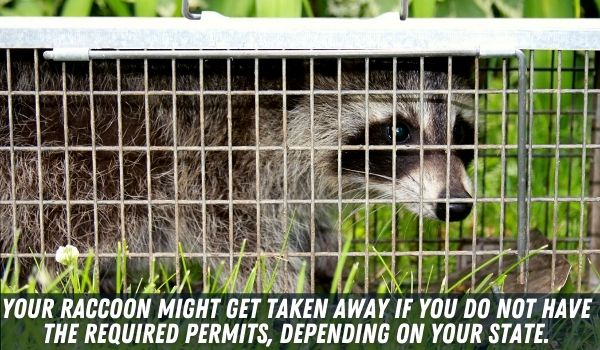
How to Get a Pet Raccoon
If you’re committed to acquiring a pet raccoon, it’s essential to first find a reputable raccoon breeder who breeds ‘domestic’ raccoons who are meant to become pets.
A proper breeder will be responsive and helpful with any questions you have.
They should also be able to show you the proper handle of the animal, and they should provide you with all history they have of the pet.
You can ask your breeder questions regarding the legality of such a pet, but it’s recommended that you first research your state’s laws.
Fill out any paperwork that is required of you, since you will not want your pet taken away once you’ve bonded.
Before committing fully, it’s recommended that you first meet with your potential new pet and get a feel for its personality.
Interact with it and picture yourself taking care of him alone.
Consider all aspects of keeping a pet raccoon before fully committing.
Before meeting your potential new pet, decide on housing, feeding, exercise routines, and extra precautions that would all need to be taken care of before the pet can be brought home.
If you’ve taken your pet raccoon home or acquired one, it is crucial to find a certified vet that can handle wild animals as pets.
Obtain all required and suggested vaccines at the vet, and check for any unusual signs in your new pet.
Some warning signs and red flags of an unadoptable raccoon included severe lack of nourishment, appearing under or overweight, lethargy, or apathy towards food.
Even if the adoption looks legitimate online, it could be a scam. Never obtain a pet raccoon over the internet, via classified ads, or from an unknown or disreputable source.
Should You Get a Large Adult Raccoon?
Adult raccoons can be quite large, but their overall size and stature can vary greatly.
They are usually between 7 and 20 pounds, and 16 to 28 inches from head to tail.
It is not at all recommended that you get an adult raccoon if you are considering buying one for a pet.
Adult raccoons have reached sexual maturity, meaning they are likely aggressive, especially if they weren’t raised in captivity or are stuck with different humans than those who raised them.
It’s better and easier for everyone involved to start your raccoon companionship off well by adopting a baby raccoon if you must have one for a pet.
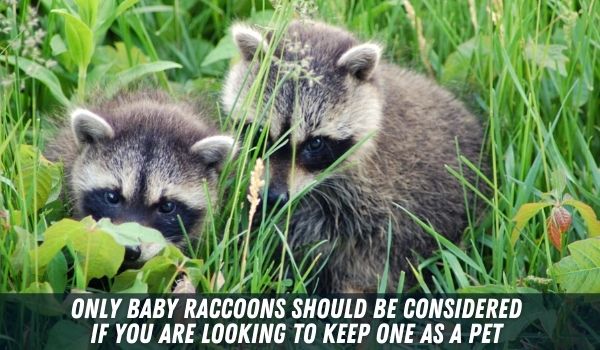
Getting a Pet Baby Raccoon
Once you’ve performed extensive research, discussed the pros and cons of owning raccoons with other raccoon owners, obtained the proper paperwork, and prepared an enriching environment for your new animal, you are ready to adopt a baby raccoon.
A baby raccoon can be obtained from a reputable and licensed breeder that will assist you with what you need to get started as a baby raccoon parent!
Keep the baby warm and invest in blankets that will help keep your baby raccoon comfortable and adjusted.
You’ll want to know how to feed your baby raccoon.
If it is not yet weaned off of bottle feeding, find a bottle with a rounded tip, as raccoons seem to prefer this nipple shape.
You can fill the bottle with Kitten Milk Replacement found in pet stores. Do not feed them cow’s milk.
With milk, evaporated milk, egg yolks, and dark Karo syrup, you can make your formula.
Feed raccoon babies four to eight times a day.
Warm the bottle before feeding, and be prepared to patch holes up caused by your rambunctious raccoon baby.
Once the raccoon baby is about six weeks old, begin introducing food to it such as human baby food or bits of fruit.
Baby raccoons require extensive amounts of care and attention. In the wild, raccoons are used to staying constantly by their family for the first year of their life.
If you find a baby raccoon in the wild that is weak or injured, contact your local wildlife rehabilitation services right away so they can properly handle the situation.
Do not take in a wild baby raccoon for any reason.
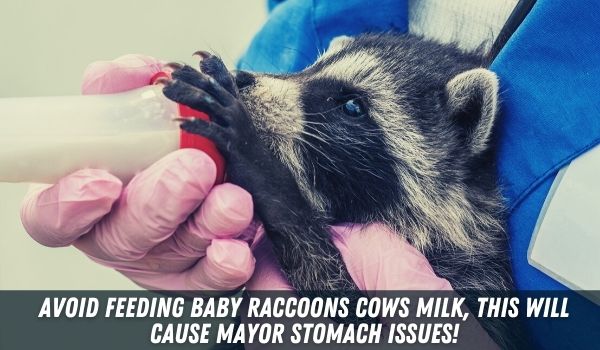
Potential Issues with Raccoon Adoption
The initial adoption process can be a large project. Here are the main potential issues you may come across when trying to adopt a pet raccoon:
- Your state does not legally allow pet raccoons.
- You do not have adequate space or shelter to properly house a raccoon.
- You do not have the funds to support the cost of a pet raccoon.
- Your family members or other pets are uncomfortable with the raccoon, or they don’t get along.
- The raccoon’s new space is not set up or not child-proofed.
- You are not researched or prepared for the effort it takes to care for a pet raccoon.
If any of these potential issues relate to your situation, you might not be able or ready to care for a pet raccoon. Carefully consider your options before adopting.
How Much Does a Raccoon Cost
If you’ve already checked the laws in your state and have decided to adopt a pet raccoon, then expect to pay an adoption fee.
You can expect to pay between $300 to $500 per raccoon, on average.
Pet raccoons are indeed pricey, so in certain cases, a new raccoon owner could pay between $500 to $700 for the adoption fee.
The variant in price can be dependant on the raccoon’s coat color, adoption location, and time of year.
How Long do Raccoons Live in Captivity
Raccoons can live for up to 20 years in captivity, but on average they will live between 10 and 15 years in captivity.
Although some types of captivity are stressful for raccoons, they still outlive their feral counterparts.
Wild raccoons don’t often live to be older than three years.
Your pet in captivity also has concerns for its life, mostly health-related.
Obesity, rabies, distemper, and other complications are common with raccoons, so keep your eye on potential symptoms.
In captivity, a raccoon can be kept alive and healthy, yet the price they pay is that of their natural abilities and feral skill.
Although a highly intelligent animal, a grown pet raccoon who never adapted to the wild would almost surely die if released.
For that reason, it’s important to check all possible escape routes of your pet raccoon so it doesn’t get out.
In turn, also do not release your pet raccoon, for any reason, back into the wild, as it will die.
If you require shelter for a pet raccoon that you can no longer care for, call your local wildlife rehabilitation center to help you.
In Conclusion
The undertaking of caring for and raising a pet raccoon is an enormous feat.
The regulations and consumption of time and energy are enough to put most people off from going through with the task of owning a raccoon.
Yet, many homes have successfully adopted and raised fulfilled pet raccoons because they put the needs of the raccoon first.
At the end of the day, the enrichment of a pet raccoon relies on its owner to live many happy years.

